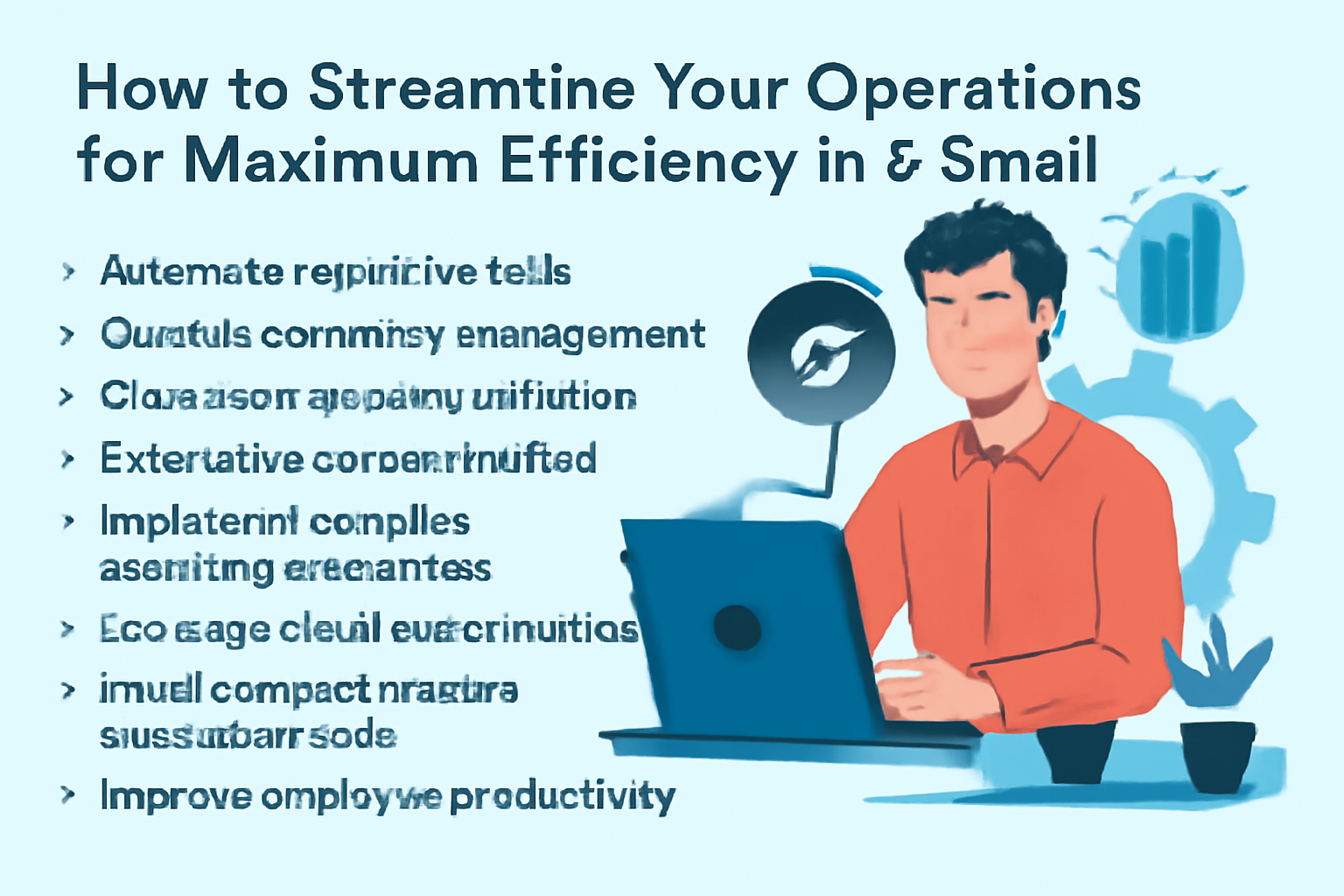As a small business owner, efficiency is key to growth and long-term success. Streamlining your operations can help reduce costs, improve productivity, and allow you to focus on the tasks that truly matter to your business. In this article, we’ll explore effective strategies that can help you optimize your business operations for maximum efficiency.
1. Automate Repetitive Tasks
One of the easiest ways to streamline your operations is by automating repetitive tasks. Many small businesses spend valuable time on administrative work, like invoicing, scheduling, or inventory management. Automation tools can handle these tasks efficiently, freeing up time for more strategic activities.
For example:
- Use software like QuickBooks or FreshBooks for automatic invoicing.
- Use Trello or Asana for task management and project collaboration.
- Set up automated email sequences with platforms like Mailchimp or ConvertKit.
By automating these tasks, you not only save time but also reduce the likelihood of human error.
2. Optimize Your Inventory Management
Effective inventory management is crucial for small businesses, especially those in retail or e-commerce. Poor inventory management can lead to overstocking or stockouts, which directly impact your cash flow and customer satisfaction.
Consider using an inventory management system like TradeGecko or Cin7 to track stock levels, forecast demand, and automate reorder processes. These systems can help you maintain optimal stock levels and avoid both excess inventory and missed sales opportunities.
3. Outsource Non-Core Activities
Small business owners often feel the need to do everything themselves, but this can lead to burnout and inefficiencies. Outsourcing non-core tasks allows you to focus on the strategic areas that drive growth.
Consider outsourcing tasks like:
- Customer service: Hire a virtual assistant or use chatbots for 24/7 customer support.
- Marketing: Outsource content creation, social media management, and SEO to experts.
- Accounting and bookkeeping: Hiring an accountant or using cloud-based accounting software can help you stay organized and avoid mistakes.
By outsourcing these tasks, you’ll have more time to focus on growing your business.
4. Streamline Communication
In a small business, communication is key, but it can also become overwhelming if not managed properly. Streamlining communication within your team and with clients can save time and reduce confusion.
Here are some tips:
- Centralize communication: Use a single platform like Slack or Microsoft Teams to manage internal communication, instead of relying on emails and meetings.
- Use project management tools: Platforms like Trello, Basecamp, or Monday.com allow you to collaborate, assign tasks, and track progress without endless email chains.
- Create templates: Save time by creating email and document templates for frequent communications, such as inquiries, proposals, or customer feedback requests.
Clear and efficient communication can prevent misunderstandings and ensure everyone is on the same page.
5. Implement Standard Operating Procedures (SOPs)
Creating Standard Operating Procedures (SOPs) for key processes in your business is an excellent way to improve efficiency. SOPs provide clear, step-by-step instructions for tasks, ensuring consistency and reducing errors.
Identify the tasks that are critical to your business and create SOPs for them. This could include processes like:
- Customer onboarding
- Product delivery
- Inventory restocking
- Employee training
Having well-defined SOPs will make it easier to delegate tasks and ensure they are carried out consistently, even when you’re not around.
6. Leverage Cloud-Based Solutions
Cloud-based tools offer flexibility, scalability, and easy collaboration, making them ideal for small businesses looking to streamline their operations. These tools allow you to access data and collaborate with team members from anywhere, improving both productivity and efficiency.
Some essential cloud-based tools for small businesses include:
- Google Workspace for document management and collaboration
- Dropbox or OneDrive for file storage
- Slack for real-time communication
- Zoom for virtual meetings
Cloud solutions also reduce the need for physical office space and allow for seamless remote work, which can further increase efficiency.
7. Track Key Performance Indicators (KPIs)
Tracking KPIs helps you measure the success of your business operations and identify areas for improvement. By monitoring your KPIs regularly, you can make informed decisions that drive your business forward.
Some important KPIs to track include:
- Sales growth
- Customer acquisition cost
- Inventory turnover
- Employee productivity
- Customer satisfaction
Using tools like Google Analytics, HubSpot, or Zoho Analytics can help you keep track of these metrics and gain valuable insights.
8. Improve Employee Productivity
Your employees are the backbone of your business, and improving their productivity can directly impact your business’s efficiency. Here are some tips to help your team perform at their best:
- Provide the right tools: Ensure your team has access to the software and equipment they need to do their job efficiently.
- Encourage collaboration: Foster a collaborative work environment where employees can easily share ideas and solve problems together.
- Offer training and development: Continuous learning opportunities help employees stay engaged and enhance their skills, leading to higher productivity.
- Recognize achievements: Regularly acknowledge and reward hard work to motivate your employees and keep morale high.
A motivated and well-equipped team will always work more efficiently, driving better results for your business.
Conclusion
Streamlining your business operations for maximum efficiency is essential for long-term success. By automating repetitive tasks, outsourcing non-core activities, and improving communication, you can save valuable time and resources. Implementing SOPs, leveraging cloud-based tools, and tracking KPIs will further help you optimize your operations. As a result, you’ll be able to focus more on growing your business and serving your customers, leading to increased profitability and success.
